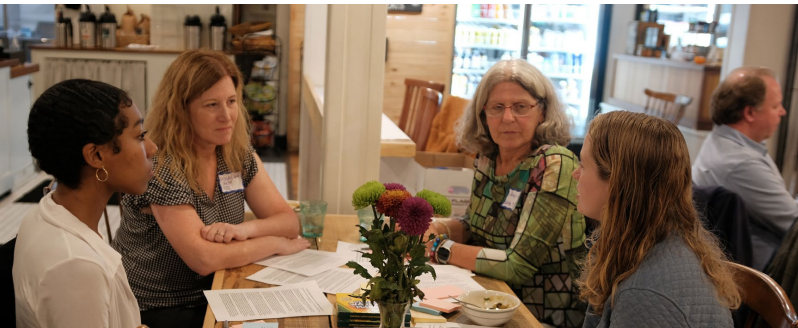Students Convene to Reflect on CT Funded Summer Experiences

In its second academic year at Middlebury, the Conflict Transformation (CT) Collaborative has reached a pivotal juncture, marked by a series of transformative milestones. This fall, following the introduction of innovative experiential opportunities, the collaborative hosted a dinner with students who participated in CT-funded experiential programs over the summer, hosted by the Center for Community Engagement, The Innovation Hub, and the Center for Careers and Internships. These initiatives provided students with unique insights into constructive conflict resolution as they navigated diverse organizational and contextual landscapes in community based contexts. The reflective event featured structured discussions in small groups, fostering a nuanced exploration of the transformative power inherent in conflict.
Agnes Roche ’24, reflecting on her experience in France, articulated the profound impact of immersing oneself in an unfamiliar cultural milieu. “Immersion in an unfamiliar cultural context and an ability to lean into difference allows us to explore the very essence of conflict transformation: that episodes of conflict are motors of change and opportunities for growth. With this mindset of growth and a positive, productive view of conflict and hardship, I am a better learner, friend, partner, teammate, and citizen.”
Mia Kojima’s involvement in the C Program “History in Translation” demonstrated the collaborative’s commitment to transcending boundaries. Focused on translating documents and oral histories related to Japanese American internment during WWII, Kojima grappled with conflicts surrounding the narrative’s custodianship. Her experience exemplified the profound impact of conflict transformation on navigating complex historical narratives.
Caroline Harding, during her internship at the United Nations Office of Disarmament Affairs, gained invaluable insights into conflict resolution in a geopolitical context. Observing how regional dynamics played out in discussions on security issues, Harding emphasized the importance of measured responses during conflicts. “My biggest takeaway is that when conflict arises, you have to think of it as something that is natural and meant to be facilitated by a place like the United Nations.”
The collaborative’s dedication to fostering constructive conversations was further underscored by two sponsored panels in late October, addressing the intricate issues surrounding Israel and Palestine. Featuring community leaders such as Zahra Moeini, Rabbi Danielle Stillman, Katie Runde Sanchez, Bill Vitek, and Marc Lapin, these discussions exemplified the collaborative’s commitment to facilitating dialogue on challenging topics.
Liza Grebenkina, a participant in the collaborative, shared her personal insights, stating, “I found myself in several situations of conflict, and I thought that it was really useful to just talk to people around me, be really honest, and be transparent.”
As the Conflict Transformation Collaborative continues to make strides in its mission to promote understanding, dialogue, and positive change, the journey unfolds with a promise of more transformative updates. Stay tuned for the evolving narrative of this impactful initiative.

